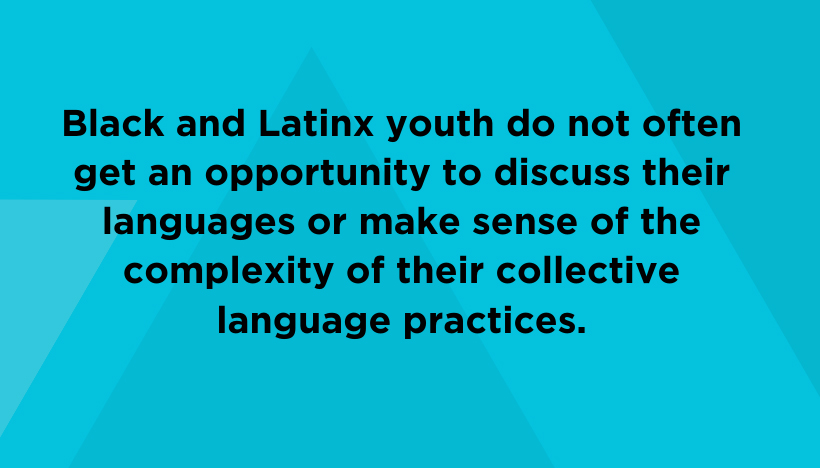This is an excerpt from “Imagining a Language of Solidarity for Black and Latinx Youth in English Language Arts Classrooms” written by Danny C. Martinez, which appeared in the January 2017 issue of English Education.
In this article, I argue that English educators must interrogate acts of physical and linguistic violence against Black and Latinx youth and take them into consideration when shaping curricula. English teachers can provide a space for youth to make sense of their racialized experiences. I highlight the marginal treatment of Black and Latinx languages in English classrooms and show the relationship between the racialized physical violence against Black and Latinx communities and the linguistic violence many Black and Latinx youth face in English classrooms. I then present examples of emerging solidarity movements between Black and Latinx activists and communities and illustrate how this renewed sense of solidarity can be leveraged to incite transformative learning experiences. I conclude with recommendations for how a language of solidarity framework can take place in all English classrooms. —Danny C. Martinez
Developing Metalinguistic Awareness of Home and Community Languages (Excerpt)
Black and Latinx youth do not often get an opportunity to discuss their languages or make sense of the complexity of their collective language practices.
One way to provide youth an opportunity to talk about their linguistic practices is to design activities where they must document their own languages across their daily lives. In Orellana, Martinez, Lee, and Montaño (2012), we provided Latinx middle school youth with small, inexpensive digital cameras and asked them to document how they use language in their everyday lives.
More specifically, after providing students with a workshop on film techniques, the youth recorded their language use with their peers, teachers, administrators, siblings, parents, family members, neighbors, and even pets! Our purpose was to work alongside these youths to see and hear how their languages shifted across respective audiences.
Collectively, we noted similarities within a predominantly Latinx student demographic; however, differences across this seemingly homogeneous group emerged.
Ways of using English and Spanish, for example, wavered as children took note of regional differences in their Spanish language use, or their hybrid language uses as they spoke to adults who were English dominant versus Spanish dominant.
This task allowed youth to recognize that while we can all speak English or Spanish, the ways we speak these languages vary. Most importantly, youth were able to develop their metalinguistic awareness about the ways they used language across their everyday lives, developing a language to talk about language.
Youths’ emerging understanding of the diverse languages of their school, homes, and communities as well as the differences among them provided a platform for building an awareness that was lacking prior to our work.
Read Danny C. Martinez’s full article in the January 2017 issue of English Education.
 Danny C. Martinez is an assistant professor at the University of California, Davis’s School of Education. Using ethnographic methods, his research examines the language and literacy practices of Black and Latinx youth in urban classrooms, in addition to teacher learning with respect to leveraging youth practices for creating expansive learning environments. Martinez’s work is informed by his previous teaching experiences in San Francisco and Los Angeles. He was a fellow in the 2010–2012 cohort of NCTE’s Cultivating New Voices among Scholars of Color program. His email address is dcmar@ucdavis.edu.
Danny C. Martinez is an assistant professor at the University of California, Davis’s School of Education. Using ethnographic methods, his research examines the language and literacy practices of Black and Latinx youth in urban classrooms, in addition to teacher learning with respect to leveraging youth practices for creating expansive learning environments. Martinez’s work is informed by his previous teaching experiences in San Francisco and Los Angeles. He was a fellow in the 2010–2012 cohort of NCTE’s Cultivating New Voices among Scholars of Color program. His email address is dcmar@ucdavis.edu.
Not a subscriber yet? No problem!
It is the policy of NCTE in all publications, including the Literacy & NCTE blog, to provide a forum for the open discussion of ideas concerning the content and the teaching of English and the language arts. Publicity accorded to any particular point of view does not imply endorsement by the Executive Committee, the Board of Directors, the staff, or the membership at large, except in announcements of policy, where such endorsement is clearly specified.

